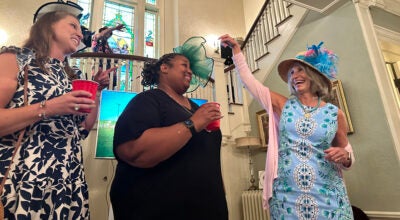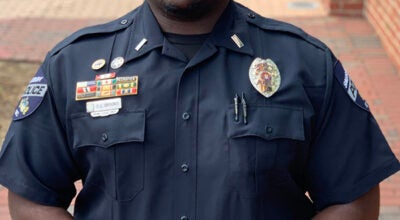Lt. governor’s office gets private-sector boost
Published 12:00 am Monday, November 4, 2013
RALEIGH (AP) — Before Gov. Pat McCrory recently backed off spending public dollars for upgrades to private bathrooms at the Executive Mansion, the trustee of another 19th century home two doors down already had figured another way to make more with less.
When new Lt. Gov. Dan Forest arrived in January at the Hawkins-Hartness House, the office of the lieutenant governor for the past 25 years, the Victorian structure was struggling to play the role of a stately workplace for state government’s No. 2 executive.
With cracked plaster, barely working toilets, banks of fluorescent lighting and heaps of exposed electrical wiring, the 1882 building owned by the state since the late 1960s needed to be refreshed, said Forest, a Raleigh architect. No extra funds for the interior were expected from legislators.
“The place was just such a mess,” Forest said.
So Forest used business connections to seek private firms willing to loan or donate to the state labor, supplies and furniture for the improvements. Companies came through, especially a Charlotte-based furniture company that outfitted Forest and his small staff in the large house with contemporary desks, bookcases, coffee tables and upholstered chairs.
“We wanted it to be different,” he said. “We wanted to do something that other lieutenant governors hadn’t done.”
Another company donated to paint interior walls, with others providing carpet and new kitchen appliances. While state electricians cleaned up wiring, Forest and his wife, Alice, bought new lighting and bathroom fixtures, hung up curtains and photographs and brought in their school-age children to spiff up the place, which had a grand re-opening in May.
Forest said other agencies could learn from seeking private help to make state government improvements.
“There’s a lot of people who are more than willing to step in and lend a hand and get things done,” Forest said in an interview, adding “we need to be good stewards of what the people own. I think that’s just good governance.”
McCrory took some heat last month when his Department of Administration released a list of state buildings to benefit from $150 million for repairs and renovations the General Assembly inserted in this year’s budget. Critics jumped on the $230,000 price tag to renovate the Executive Mansion’s second-floor bathrooms, which date to the 1970s, while agencies keep facing cutbacks. McCrory’s office said later that the governor wouldn’t use tax money for the bathroom upgrades, and the final list presented to lawmakers last week omitted the project.
The deterioration of the Hawkins-Hartness House was symptomatic of years of diminished funds for capital projects and upkeep across state government, but also that the lieutenant governor’s office can be an afterthought. Forest’s primary job is to preside over state Senate debate, but he is unable to file bills. He votes only in a tie. He serves on a handful of state boards and performs additional duties McCrory subscribes to him.
The loaned and donated items to the state for the Hawkins-Hartness House are valued at more than $270,000, according to itemized figures provided by Forest’s office. But the actual value is less because office furniture — making up nearly the entire amount — usually is sold from 30 to 50 percent below the list price provided. Most of the desks, for example, are listed from roughly $4,000 to $7,000.
David Longo, president and CEO of CBI Interiors of Charlotte, which loaned the office furniture to the state, said that when he initially entered the house, he was shocked about the poor message the interior was sending to guests about North Carolina.
“The house now as a whole is a place I believe represents our state well,” Longo said Friday. “It is not overstated, but it is proper and it’s functional.”
Forest said his office communicated closely with the State Ethics Commission to determine how gifts and loans for the house could be made without breaking the law or preventing conflicts of interest.
Longo said he’s known Forest for about 20 years. He gave the $12,000 maximum in donations to Forest’s 2012 campaign, according to records at the State Board of Elections. Longo said he’s got no ulterior motives to helping Forest or the state. He said he just wants a state with a strong business environment and efficient government that benefits everyone.
Bob Phillips with the government reform group Common Cause North Carolina said he deserves credit making the improvements without using taxpayer dollars — as long as people who made loans and donations aren’t seeking influence or anything in return, and conflict-of-interest lines are drawn clearly.
Phillips has a soft place in his heart for the Hawkins-Hartness House. He worked on the second floor as communications director for then-Lt. Gov. Dennis Wicker in the 1990s.
“We enjoyed working there, and I treasured it,” Phillips said.
Phillips and Forest also lamented the condition of other older properties around the mansion and lieutenant governor’s office. McCrory has raised similar concerns and is trying to do something about it.
The repairs and renovations list approved last week includes $138,000 for exterior paint and repairs to the Hawkins-Hartness House and $131,000 for similar outside repairs to the Executive Mansion. The vacant Heck Andrews House, known as one of the first homes built in Raleigh after the Civil War, also will get $485,000 of outside work. But there’s nothing for inside.



